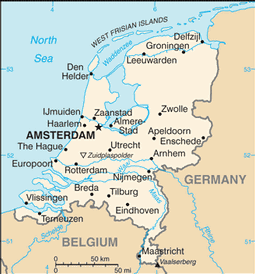Netherlands
 Netherlands is country of Europe located in west Europe.
Netherlands is country of Europe located in west Europe.
Details
| Official Name: | Netherlands |
| Capital: | Amsterdam |
| Total area: | 41 543 km2 |
| GDP per capita: | $42,193 |
| Native Language: | Dutch |
| Government: | Unitary parliamentary representative democracy under constitutional monarchy |
| Population: | 16,788,973 |
| Major Religion: | Roman Catholicism |
| Monetary Unit: | Euro (EUR) |
The Netherlands, as the name indicates, is low-lying territory, with one-quarter of the country at or below sea level. Many areas are protected from flooding by dykes and sea walls. Much land has been reclaimed from the sea, the Flevoland polder being the most recent example.
The Dutch Parliament (or Staten Generaal) consists of two chambers. The first, with 75 members, is indirectly elected and has limited powers. The second chamber, or lower house, is directly elected. Members of both houses serve a four-year term. Given the country’s multi-party system, all governments are coalitions.
Industrial activity in the Netherlands predominantly consists of food processing, chemicals, petroleum refining as well as electrical and electronic machinery. It has a dynamic agricultural sector and is well known for its plants and cut flowers. The port of Rotterdam is the busiest in Europe, serving a vast hinterland which stretches into Germany and central Europe.
The Netherlands has a history of great painters. The 17th century was the age of the Dutch Masters, such as Rembrandt van Rijn, Johannes Vermeer and Jan Steen. The 19th and 20th centuries were no less remarkable for their high-calibre artists like Vincent van Gogh and Piet Mondriaan.
Well-known Dutch specialities include raw herring, smoked eel and pea soup, as well as a wide variety of cheeses such as Edam and Gouda.
Health & Welfare
Europe's most comprehensive welfare system includes education health, employment, and social welfare.
Economy & Jobs
Foreign trade, manufacturing, construction, and services.
Main Attractions
Amsterdam, Hoge Veluwe National Park, Maastricht town, and the Randstad region.
Economy
The Netherlands has a developed economy and has been playing a special role in the European economy for many centuries. Since the 16th century, shipping, fishing, trade, and banking have been leading sectors of the Dutch economy. The Netherlands is one of the world's 10 leading exporting countries. Foodstuffs form the largest industrial sector. Other major industries include chemicals, metallurgy, machinery, electrical goods, and tourism. Examples include Unilever, Heineken, financial services (ING), chemicals (DSM), petroleum refining (Shell), electronical machinery (Philips, ASML) and car navigation TomTom.
The Netherlands has the 17th-largest economy in the world, and ranks 10th in GDP (nominal) per capita. Between 1997 and 2000 annual economic growth (GDP) averaged nearly 4%, well above the European average. Growth slowed considerably from 2001 to 2005 with the global economic slowdown, but accelerated to 4.1% in the third quarter of 2007. In May 2013 inflation was at 2.8% per year. In April 2013 unemployment was at 8.2% of the labour force.
Immigration and residency
If you are interested in moving to the countries, either with a residence permit or by acquiring a citizenship, please contact us, and also get acquainted with the relevant migration documents.